初三英语形容词副词
2023年中考英语语法笔记:形容词与副词
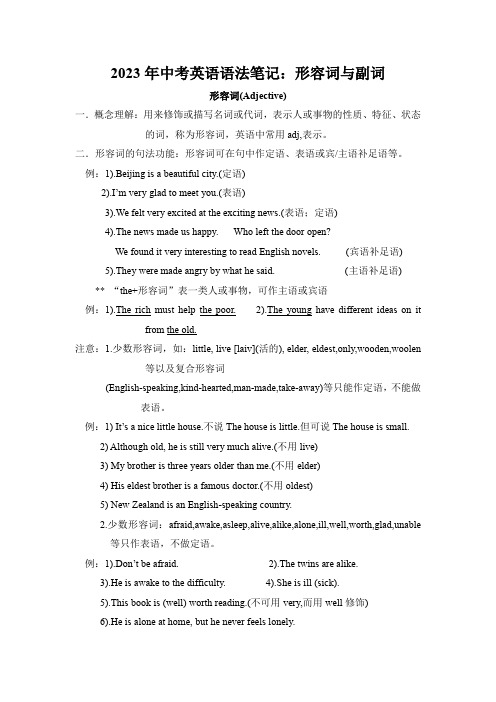
2023年中考英语语法笔记:形容词与副词形容词(Adjective)一.概念理解:用来修饰或描写名词或代词,表示人或事物的性质、特征、状态的词,称为形容词,英语中常用adj,表示。
二.形容词的句法功能:形容词可在句中作定语、表语或宾/主语补足语等。
例:1).Beijing is a beautiful city.(定语)2).I’m very glad to meet you.(表语)3).We felt very excited at the exciting news.(表语;定语)4).The news made us happy. Who left the door open?We found it very interesting to read English novels. (宾语补足语)5).They were made angry by what he said. (主语补足语)** “the+形容词”表一类人或事物,可作主语或宾语例:1).The rich must help the poor. 2).The young have different ideas on it from the old.注意:1.少数形容词,如:little, live [laiv](活的), elder, eldest,only,wooden,woolen 等以及复合形容词(English-speaking,kind-hearted,man-made,take-away)等只能作定语,不能做表语。
例:1) It’s a nice little house.不说The house is little.但可说The house is small.2) Although old, he is still very much alive.(不用live)3) My brother is three years older than me.(不用elder)4) His eldest brother is a famous doctor.(不用oldest)5) New Zealand is an English-speaking country.2.少数形容词:afraid,awake,asleep,alive,alike,alone,ill,well,worth,glad,unable等只作表语,不做定语。
初中英语---形容词变副词整理与归纳

初中英语---形容词变副词整理与归纳形容词变副词1.形容词+ lybad——badly 坏地bright——brightly 明亮地casual——casually 随意地clear——clearly 清楚地complete——completely 完全correct——correctly 正确地final——finally 最后fortunate——fortunately幸运地general——generally 一般来讲loud——loudly 大声地particular ——particularly特别地polite——politely 礼貌地proper ——properly适当地main——mainly 主要地most ——mostly 多半,大多数normal——normally 正常地quick——quickly 迅速地quiet——quietly 轻轻地,安静地real——really 真正地recent ——recently 最近;近来sad——sadly 悲哀地slow——slowly 缓慢地special——specially 专门,特殊地specific——specifically 特定地,明确地strong——strongly 坚决地,强烈地sudden——suddenly突然usual——usually 通常2. 以le 结尾的,去e + y comfortable——comfortably 舒服地gentle——gently 温柔地possible——possibly 可能地simple——simply 仅仅;只;简单地terrible——terribly 非常;极度地3. 辅音字母+ y 变y为 ilyeasy——easily 容易地heavy——heavily 沉重地happy——happily 快乐地4.特殊good——well好地true——truly 真实地。
初中英语语法—形容词、副词PPT课件

2. Don’t worry. There is __C__ about your illness.
A.serious something B. anything serious
C. nothing serious D. some thing
3.There is __C__ in today’s newspaper. It’s boring.
1.Is there anything interesting in today’s newspaper ?
2. I have something important to tell you.
-
7
1. Sam is hungry, he’d like to eat _C___delicious.
A. some B. any C. something D. somewhere
The windows of our classroom are cleaner than those of theirs.
-
23
1、as+形容词原形+as
Tom is as tall as Mike.
There are as many students in our
school as yours.
3、… too+原级+ to do sth.
He is too young to join the army.
4、形容词原级+ enough to do sth.
This truck is big enough to carry 5 tons.
-
25
1、两者之间的比较,句中有明显的标志词than
Tom is taller than John
中考英语形容词-副词复习

形容词的构成通常有:
1、+ful
forget—forgetful
help—helpful
wonder—wonderful use—useful
care—careful
beauty—beautiful
thank-thankful
colour ----colourful
farther/further farthest/furthest older/elder oldest/eldest
as+形容词原形+as
Tom is as tall as Mike.
There are as many students in our
school as yours.
否定 not as+形容词原形+as “和… 不一样”
注意:
中考英语专项复习 形容词和副词
①最高级前可以有序数词来修饰。例如:
Which is the first most useful
invention? 哪一个是第一个最有用途的发明?
②如果形容词最高级前有物主代词,指示代 词,名词所有格时,则不必加定冠词the。 例如:
Yesterday was my busiest day. 昨天是 我最忙碌的一天。
Which is easier, maths or English? 3、能修饰比较级的副词及短:much(…的多)、 a lot(…的多)、even(更…)、still(更…)、a bit/alittle(…一点儿)
This city is much more beautiful than
hat one
明确这两种词的基本意义以及在语句中的功能和 位置, 如形容词具有修饰和限定作用,一般用来 修饰名词,在语句中可用作定语和表语;
中考英语专题复习(九)形容词、副词(含练习与答案).
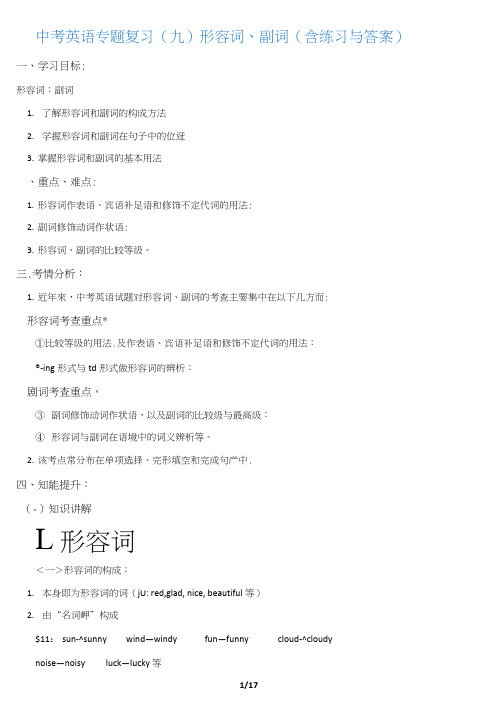
中考英语专题复习(九)形容词、副词(含练习与答案)一、学习目标:形容词:副词1.了解形容词和副词的构成方法2.学握形容词和副词在句子中的位迓3.掌握形容词和副词的基本用法、重点、难点:1.形容词作表语、宾语补足语和修饰不定代词的用法:2.副词修饰动词作状语:3.形容词、副词的比较等级。
三.考情分析:1.近年來,中考英语试题对形容词、副词的考査主要集中在以下几方而:形容词考查重点*①比较等级的用法.及作表语、宾语补足语和修饰不定代词的用法:®-ing形式与td形式做形容词的辨析:剧词考査重点,③副词修饰动词作状语,以及副词的比较级与最髙级:④形容词与副词在语境中的词义辨析等。
2.该考点常分布在单项选择、完形填空和完成句产中.四、知能提升:(-)知识讲解L形容词<一>形容词的构成:1.本身即为形容词的词(jU: red,glad, nice, beautiful等)2.由“名词岬”构成$11: sun-^sunny wind—windy fun—funny cloud-^cloudynoise—noisy luck—lucky 等3.形容词具仃独特的后缀形式主要右:-able, -ible, -al, -ical, -ant, -ary, -ful, -less, -ous 等.如:comfortable, terrible, national, natural, political, chemical, imports nt, pleasa nJ ordinary, necessary, beautiful, wonderful, careful^ hopeless, careless, famous^ dangerous 等。
4.以」y结尾的形容词如:friendly友好的:lonely孤独的:lovely可爱的:等v二〉形容词的用法及位置1.作定语形容词修饰名词时迓于名词Z前:修饰不定代词时,置于不定代词之后。
初中英语形容词和副词

例题: 1. She was _____ (luck) to lose her money when she went shopping last weekend. [04西宁] 2. This kind of skirt looks __ and sells__. [04天津] A. nice; well B. nice; good C. well; well D. good; nice
3.某些描述感觉或心情的形容词: glad 高兴的 pleased 高兴的 sorry 难过的 I’m glad to hear that. 听到这消息我很高兴。 You will be sorry about this later. 对这件事你以后会后悔的。 We are very pleased with the plan. 我们对这个计划很满意。 【注】若用于其他意思,则可用作定语,如 glad 表示“(感到)高兴的”时,只用作表语;若表示“令人高兴的”,则只用作定语(glad news 好消息)。
A
A
4).The house smells as if it hasn’t been lived in for years. A. Little white wooden B. little wooden white C. white wooden little D. wooden white little 5). Students are required to take part in the boat race. A. Ten strong young Chinese B. Ten Chinese strong young C. Chinese ten young strong D. Young strong ten Chinese
九年级英语形容词和副词PPT课件

(3) A +be+比较级十than+ B 表示“A比B……”。如:
Planes are faster than trains.飞机比火车快。 (4) A+ be+ less+原级十than B 表示“A没有/不如B……”。如: Lucy is less careful than Lily.露西没有莉莉细心。 (5) the+比较级+…… ;the+比较级+……
领域密切合作”,closely修饰动词work,其他三项语意不符。故选A。
考点3 形容词和副词的比较等级
1.形容词和副词的比较等级的构成
(1)规则变化
构成方法
示例
一般在单音节词词尾加er或est
small→smaller→smallest; fast→faster→fastest;
quick→quicker→quickest
Bill gets up late on weekends.
比尔在周末起得晚。
Life here is rich and
作后置定语,多表示时间或地点
interesting.
这里的生活既丰富多彩又有趣。
2.形容词和副词的转换形式 副词一般由形容词变化而来,常见的变化规则如下:
变化规则 大多数在形容词词尾加 ly
九年级英语 形容词和副词
考点1 形容词 1.形容词的基本用法
用法 作定语,用于名词前或不定
代词后
作表语,用于系动词后
作宾语补足语,常用于keep, make,leave等动词的宾语
后
例句 Han Mei is a beautiful girl.
韩梅是一个漂亮的女孩。 The meal is very delicious.
初中英语中考语法形容词和副词总结归纳
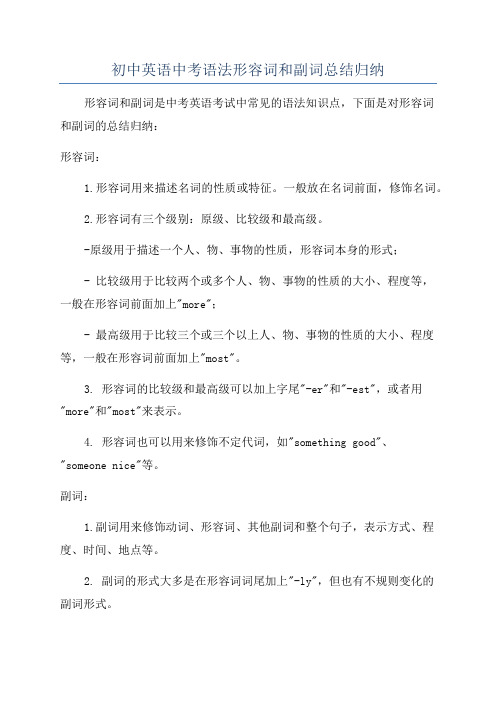
初中英语中考语法形容词和副词总结归纳形容词和副词是中考英语考试中常见的语法知识点,下面是对形容词和副词的总结归纳:形容词:1.形容词用来描述名词的性质或特征。
一般放在名词前面,修饰名词。
2.形容词有三个级别:原级、比较级和最高级。
-原级用于描述一个人、物、事物的性质,形容词本身的形式;- 比较级用于比较两个或多个人、物、事物的性质的大小、程度等,一般在形容词前面加上"more";- 最高级用于比较三个或三个以上人、物、事物的性质的大小、程度等,一般在形容词前面加上"most"。
3. 形容词的比较级和最高级可以加上字尾"-er"和"-est",或者用"more"和"most"来表示。
4. 形容词也可以用来修饰不定代词,如"something good"、"someone nice"等。
副词:1.副词用来修饰动词、形容词、其他副词和整个句子,表示方式、程度、时间、地点等。
2. 副词的形式大多是在形容词词尾加上"-ly",但也有不规则变化的副词形式。
3. 副词有原级和比较级,形式和形容词的比较级一样,可以在副词前面加上"more"来表示。
注意事项:1.形容词和副词的比较级和最高级要根据词的性质和词尾变化,不是所有形容词和副词都可以直接加上字尾来表示比较级和最高级。
2.形容词和副词的用法、位置和修饰的词性有一定的规律,需要具体问题具体分析。
以上是对初中英语中考语法中形容词和副词的总结归纳,希望能够帮助到你。
初中英语常用形容词 副词
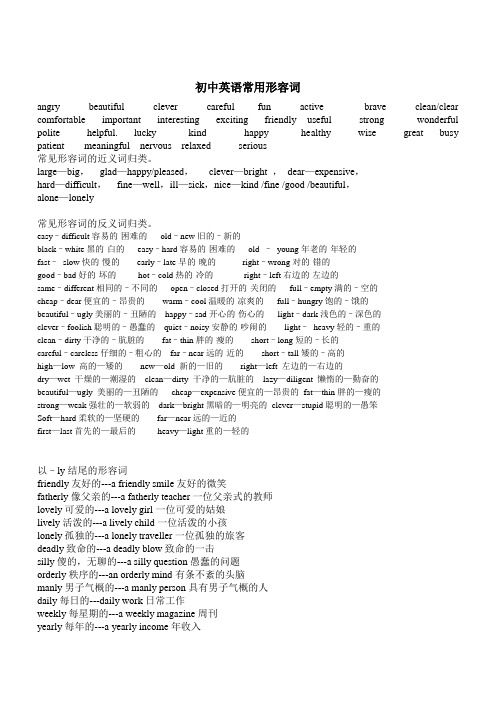
初中英语常用形容词angry beautiful clever careful fun active brave clean/clear comfortable important interesting exciting friendly useful strong wonderful polite helpful. lucky kind happy healthy wise great busy patient meaningful nervous relaxed serious常见形容词的近义词归类。
large—big,glad—happy/pleased,clever—bright ,dear—expensive,hard—difficult,fine—well,ill—sick,nice—kind /fine /good /beautiful,alone—lonely常见形容词的反义词归类。
easy–difficult容易的-困难的old–new旧的–新的black–white黑的-白的easy–hard容易的-困难的old –young年老的-年轻的fast–slow快的-慢的early–late早的-晚的right–wrong对的-错的good–bad好的-坏的hot–cold热的-冷的right–left右边的-左边的same–different相同的–不同的open–closed打开的-关闭的full–empty满的–空的cheap–dear便宜的–昂贵的warm–cool温暖的-凉爽的full–hungry饱的–饿的beautiful–ugly美丽的–丑陋的happy–sad开心的-伤心的light–dark浅色的–深色的clever–foolish聪明的–愚蠢的quiet–noisy安静的-吵闹的light–heavy轻的–重的clean–dirty干净的–肮脏的fat–thin胖的-瘦的short–long短的–长的careful–careless仔细的–粗心的far–near远的-近的short–tall矮的–高的high—low 高的—矮的new—old 新的—旧的right—left 左边的—右边的dry—wet 干燥的—潮湿的clean—dirty 干净的—肮脏的lazy—diligent 懒惰的—勤奋的beautiful—ugly 美丽的—丑陋的cheap—expensive便宜的—昂贵的fat—thin胖的—瘦的strong—weak强壮的—软弱的dark—bright黑暗的—明亮的clever—stupid聪明的—愚笨Soft—hard柔软的—坚硬的far—near远的—近的first—last首先的—最后的heavy—light重的—轻的以–ly结尾的形容词friendly友好的---a friendly smile友好的微笑fatherly像父亲的---a fatherly teacher一位父亲式的教师lovely可爱的---a lovely girl一位可爱的姑娘lively活泼的---a lively child一位活泼的小孩lonely孤独的---a lonely traveller一位孤独的旅客deadly致命的---a deadly blow致命的一击silly傻的,无聊的---a silly question愚蠢的问题orderly秩序的---an orderly mind有条不紊的头脑manly男子气概的---a manly person具有男子气概的人daily每日的---daily work日常工作weekly每星期的---a weekly magazine周刊yearly每年的---a yearly income年收入副词的分类副词按词汇意义可分为:方式副词:well,fast,slowly,carefully,quickly程度副词:very,much,enough,almost,rather,quite地点副词:here,there,out,somewhere,abroad,home哪些单词既是形容词又是副词初中常见的有:fast, hard, enough, early, late,t,high,far方式副词:well(好地) fast(快地) carefully(小心地) quickly(快地)sadly(伤心地)badly(严重地,非常)slowly(慢慢地)politely(有礼貌地)proudly(骄傲地),carelessly(粗心地)properly(适当地,完全地)successfully(成功地)happily(高兴地)angrily(生气地,愤怒地)。
初中英语知识点归纳形容词和副词的用法区别总结

初中英语知识点归纳形容词和副词的用法区别总结形容词和副词是英语语法中的两个重要部分。
它们在句子中具有不同的作用和用法。
下面是对初中英语知识点中形容词和副词用法区别的总结。
一、形容词的用法1. 形容词可以修饰名词,并在句中作定语,用于描述名词的性质、特征或状态。
例句:a beautiful girl(一个美丽的女孩)2. 形容词可以充当表语,与系动词be连用,用于描述主语的性质或状态。
例句:She is intelligent.(她很聪明。
)3. 形容词可以在句中作宾语补足语,用于补充说明及描述宾语。
例句:I found the movie interesting.(我觉得这部电影有趣。
)4. 形容词可以用来表示数量或顺序的范围。
例句:He has only three books.(他只有三本书。
)二、副词的用法1. 副词可以修饰动词,用于描述动作的方式、频率、程度等。
例句:She runs quickly.(她跑得很快。
)2. 副词可以修饰形容词,用于描述形容词所修饰的程度。
例句:He is very tall.(他非常高。
)3. 副词可以修饰其他副词,用于描述副词之间的程度关系。
例句:He speaks English quite fluently.(他英语说得相当流利。
)4. 副词可以在句中作状语,表示时间、地点、原因、方式、条件等。
例句:We will go to the park tomorrow.(我们明天去公园。
)三、形容词和副词的区别1. 作用对象不同- 形容词主要用于修饰名词,描述名词的性质、特征或状态。
- 副词主要用于修饰动词、形容词、其他副词,表示动作的方式、程度、频率等。
2. 词性不同- 形容词是描述性词,属于形容词类。
- 副词是修饰性词,属于副词类。
3. 位置不同- 形容词通常位于名词之前,修饰名词。
- 副词可以位于动词、形容词、副词等之前或之后,修饰这些词。
4. 用法不同- 形容词在句中可以作定语、表语、宾语补足语等。
初中英语知识点归纳形容词和副词归纳

初中英语知识点归纳形容词和副词归纳英语中的形容词(Adjective)和副词(Adverb)是我们学习英语语法必须要掌握的重要知识点。
形容词用来修饰名词,描述事物的性质和特征;而副词则用来修饰动词、形容词、副词等,表示程度、方式、时间等。
一、形容词的基本用法1. 形容词的位置:形容词通常位于名词前面。
例句:- A beautiful flower.- The tall boy.2. 形容词的比较级和最高级:形容词的比较级表示两个人或物之间的比较,最高级表示三个或三个以上人或物之间的比较。
例句:- This book is more interesting than that one.- Lily is the tallest girl in our class.3. 形容词的修饰范围:形容词可以修饰单数或复数的名词。
例句:- The red apple is sweet.- The red apples are sweet.4. 形容词的性、数和格的变化:形容词的形式根据名词的性、数和格的变化而变化。
例句:- He is a happy boy.- She is a happy girl.二、常见形容词分类1. 大小、长短、高低等形容词:- big(大)- small(小)- long(长)- short(短)- tall(高)- low(低)2. 颜色形容词:- red(红色)- blue(蓝色)- green(绿色)- yellow(黄色)3. 品质形容词:- good(好的)- bad(坏的)- happy(快乐的)- sad(伤心的)三、副词的基本用法1. 副词的位置:副词通常位于动词或形容词之后。
例句:- He runs quickly.- She speaks English fluently.2. 副词修饰动词的方式:副词可以修饰动词,表示动作的方式。
例句:- She sings beautifully.- He speaks loudly.3. 副词修饰形容词或副词的程度:副词可以修饰形容词或副词,表示程度或程度的变化。
05形容词副词专题-2022年“超细”中考英语语法专题

第一部分词类语法形容词/副词(Adjective/Adverb)Lookerson see more than players. 当局者迷,旁观者清必知考点1:形容词/副词的构成◇G构成常见的形容词的构成①以[y]结尾:health + [y] →healthy 健康的greed + [y] →greedy 贪婪的②以[al], [ial]结尾:natur(e) + [al] →natural 自然的influent + [ial] →influential 有影响力的③以[ful], [less]结尾:success + [ful] →successful 成功的aim + [less] →aimless 无目标的④以[able]结尾:afford + [able] →affordable 可支持的reason + [able] →reasonable 有原因的⑤以[ive]结尾:product + [ive] →productive 有生产力的attract + [ive] →attractive 有吸引力的⑥以[ly]结尾:friend + [ly] →friendly 友好的live + [ly] →lively 生机勃勃的⑦以[ous], [ious]结尾:fam(e) + [ous] →famous 著名的spac(e) + [ious] →spacious 广大的⑧复合形容词:kind + hearted →kindhearted 心地善良的dark + blue →darkblue 暗蓝色的巧思:对[形容词后缀]的一些建议①不要特意去记,[后缀]只能辅助记忆,不能作为[背单词的手段]a. [形容词]中文翻译带有“的”字;b. 许多[形容词]都是由[差不多意思的其他词性]变换而来,因此背单词时只需要在原有单词含义基础上添加“的”字即可。
②[ful]结尾的形容词含义是:“充满……的”如:success n. 成功+ [ful] =充满成功的:successful③[able]结尾的形容词含义是:“能够……的”如:afford v. 支持+ [able] =可以支持的:affordable④[ive]结尾的形容词含义是:“有……性质的”如:act n. 行为+ [ive] =活力的:active⑤[less]是[否定形容词后缀]如:home n. 家+ [less] =无家可归的:homeless副词的构成①[形容词] + [ly]构成副词:happy →改y为i + [ly] →happily 高兴地careful + [ly] →carefully 认真地②天生就是[副词]:hard adv. 努力地alone adv. 孤独地巧思:不要被[ly]迷惑不是所有的以[ly]结尾的单词都是[副词]a. [adj.] + [ly] →[adv.]successful + [ly] →successfully adv. 成功地b. [v.], [n.] + [ly] →[adj.]like + [ly] →likely adj. 有可能的必知考点2:形容词变副词的细则形容词变副词细则①一般在[形容词]末尾加[ly]quick + [ly] →quickly slow + [ly] →slowly②以[辅音字母加y结尾]的[形容词],把[y]变成[i]再加[ly]happy →变[y]为[i] + [ly] →happily angry →变[y]为[i] + [ly] →angrily③少数以[e]结尾的[形容词],需要去掉[e]再加[y]或[ly]true →去掉[e] + [ly] →truly fortable →去掉[e] + [y] →fortably④有些以[ble], [ple]或[tle]结尾的[形容词],要去掉[e]再加[y]simple →去掉[e] + [y] →simply gentle →去掉[e] + [y] →gentlyterrible →去掉[e] + [y] →terribly⑤以[l]结尾的[形容词]在词尾加[ly],以[ll]结尾的[形容词]在词尾加[y]usual + [ly] →usually full + [y] →fully必考考点1:形容词与副词的用法及位置◇W位置形容词的位置①多数情况下,[形容词]作[前置定语]·Nice and warm days are ing.好且温暖的日子来临了。
初中英语语法大全:形容词和副词汇总
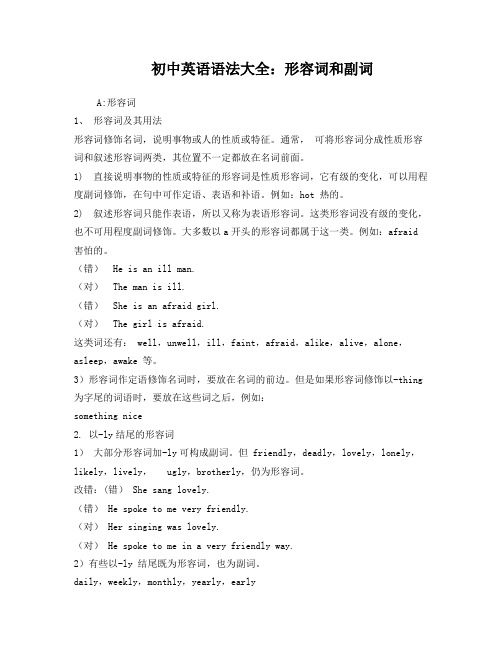
初中英语语法大全:形容词和副词A:形容词1、形容词及其用法形容词修饰名词,说明事物或人的性质或特征。
通常,可将形容词分成性质形容词和叙述形容词两类,其位置不一定都放在名词前面。
1) 直接说明事物的性质或特征的形容词是性质形容词,它有级的变化,可以用程度副词修饰,在句中可作定语、表语和补语。
例如:hot 热的。
2) 叙述形容词只能作表语,所以又称为表语形容词。
这类形容词没有级的变化,也不可用程度副词修饰。
大多数以a开头的形容词都属于这一类。
例如:afraid 害怕的。
(错)He is an ill man.(对)The man is ill.(错)She is an afraid girl.(对)The girl is afraid.这类词还有: well,unwell,ill,faint,afraid,alike,alive,alone,asleep,awake 等。
3)形容词作定语修饰名词时,要放在名词的前边。
但是如果形容词修饰以-thing 为字尾的词语时,要放在这些词之后,例如:something nice2. 以-ly结尾的形容词1)大部分形容词加-ly可构成副词。
但 friendly,deadly,lovely,lonely,likely,lively, ugly,brotherly,仍为形容词。
改错:(错) She sang lovely.(错) He spoke to me very friendly.(对) Her singing was lovely.(对) He spoke to me in a very friendly way.2)有些以-ly 结尾既为形容词,也为副词。
daily,weekly,monthly,yearly,earlyThe Times is a daily paper.The Times is published daily.3 用形容词表示类别和整体1)某些形容词加上定冠词可以泛指一类人,与谓语动词的复数连接。
初中英语2024届中考作文提分词语(副词+形容词)
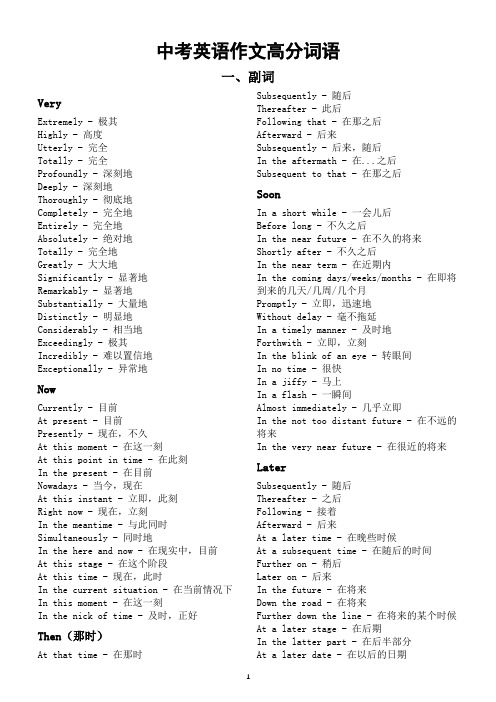
中考英语作文高分词语一、副词VeryExtremely - 极其Highly - 高度Utterly - 完全Totally - 完全Profoundly - 深刻地Deeply - 深刻地Thoroughly - 彻底地Completely - 完全地Entirely - 完全地Absolutely - 绝对地Totally - 完全地Greatly - 大大地Significantly - 显著地Remarkably - 显著地Substantially - 大量地Distinctly - 明显地Considerably - 相当地Exceedingly - 极其Incredibly - 难以置信地Exceptionally - 异常地NowCurrently - 目前At present - 目前Presently - 现在,不久At this moment - 在这一刻At this point in time - 在此刻In the present - 在目前Nowadays - 当今,现在At this instant - 立即,此刻Right now - 现在,立刻In the meantime - 与此同时Simultaneously - 同时地In the here and now - 在现实中,目前At this stage - 在这个阶段At this time - 现在,此时In the current situation - 在当前情况下In this moment - 在这一刻In the nick of time - 及时,正好Then(那时)At that time - 在那时Subsequently - 随后Thereafter - 此后Following that - 在那之后Afterward - 后来Subsequently - 后来,随后In the aftermath - 在...之后Subsequent to that - 在那之后SoonIn a short while - 一会儿后Before long - 不久之后In the near future - 在不久的将来Shortly after - 不久之后In the near term - 在近期内In the coming days/weeks/months - 在即将到来的几天/几周/几个月Promptly - 立即,迅速地Without delay - 毫不拖延In a timely manner - 及时地Forthwith - 立即,立刻In the blink of an eye - 转眼间In no time - 很快In a jiffy - 马上In a flash - 一瞬间Almost immediately - 几乎立即In the not too distant future - 在不远的将来In the very near future - 在很近的将来LaterSubsequently - 随后Thereafter - 之后Following - 接着Afterward - 后来At a later time - 在晚些时候At a subsequent time - 在随后的时间Further on - 稍后Later on - 后来In the future - 在将来Down the road - 在将来Further down the line - 在将来的某个时候At a later stage - 在后期In the latter part - 在后半部分At a later date - 在以后的日期1AlwaysConsistently - 一贯地Perpetually - 永久地Unceasingly - 不停地Eternally - 永远地Constantly - 不断地Forever - 永远At all times - 一直On every occasion - 每次Regularly - 定期地Routinely - 常规地Repeatedly - 反复地Continuously - 连续地Endlessly - 无休止地Every moment - 每时每刻Nonstop - 不停地Uninterruptedly - 不间断地SeldomRarely - 很少地Infrequently - 不经常地Occasionally - 偶尔Scarcely - 几乎不Hardly ever - 几乎从不Not often - 不常Uncommonly - 不常见的At intervals - 间歇地Now and then - 偶尔Once in a while - 偶尔Not frequently - 不频繁地Not usually - 不通常Not regularly - 不规律地At long intervals - 长时间间隔地On rare occasions - 在极少数情况下In exceptional cases - 在特殊情况下From time to time - 偶尔On occasion - 有时NeverAt no time - 在任何时候都不Not ever - 从不Not once - 一次也不Under no circumstances - 在任何情况下都不In no case - 在任何情况下都不No matter what - 无论什么情况Without exception - 毫无例外Absolutely not - 绝对不Not for a moment - 一刻也不Not under any condition - 在任何条件下都不Not at all - 根本不Not in the least - 一点也没有Not in any way - 以任何方式都不Not in any event - 在任何情况下都不Not on any account - 无论什么理由都不Not at any point - 在任何时候都不Not on any occasion - 在任何场合都不HereAt this place - 在这个地方In this location - 在这个位置On this spot - 在这个点上In this area - 在这个区域At this point - 在这一点上On this site - 在这个地点At this location - 在这个位置Right here - 就在这里This very place - 就是这个地方On this ground - 在这片土地上ThereAt that place - 在那个地方In that location - 在那个位置Over there - 在那边On that spot - 在那个点上In that area - 在那个区域At that point - 在那个点上At that site - 在那个地点At that position - 在那个位置At that distance - 在那个距离At that corner - 在那个角落At that end - 在那一端At that side - 在那边At that distance - 在那个距离At that stage - 在那个阶段(或地点)EverywhereAll over - 到处Throughout - 遍及Here and there - 到处Everywhere about - 到处In all places - 在所有地方In every corner - 在每个角落All around - 四周,到处In every direction - 朝每个方向2On every side - 在每一面Universally - 普遍地Ubiquitously - 无处不在地In all quarters - 在所有方面In every respect - 在每个方面In all areas - 在所有领域In every part - 在每个部分二、形容词ImportantCrucial - 至关重要的Significant - 重大的Essential - 必要的Vital - 至关重要的Indispensable - 不可缺少的Critical - 关键的Primary - 主要的Substantial - 大量的,实质的Consequential - 重要的,有影响的Prominent - 突出的Notable - 值得注意的Influential - 有影响力的Profound - 深远的HappyJoyful - 充满喜悦的Content - 满意的,满足的Delighted - 高兴的,快乐的Cheerful - 快乐的,愉快的Pleased - 高兴的,满意的Satisfied - 满意的Thrilled - 非常兴奋的,非常高兴的SadGloomy - 阴郁的,沮丧的Lonely - 孤独的,寂寞的Heartbroken - 心碎的Miserable - 痛苦的,悲惨的Mournful - 悲伤的,哀悼的GoodCrucial - 至关重要的Significant - 重大的Essential - 必要的Vital - 至关重要的Indispensable - 不可缺少的Critical - 关键的Primary - 主要的Substantial - 大量的,实质的Consequential - 重要的,有影响的Prominent - 突出的Notable - 值得注意的Influential - 有影响力的Profound - 深远的InterestingEngaging - 吸引人的,迷人的Captivating - 迷人的,令人着迷的Fascinating - 极有吸引力的,迷人的Compelling - 引人入胜的,强制的Intriguing - 引起好奇心的,有趣的Enchanting - 迷人的,令人陶醉的Stimulating - 刺激的,激励的Thought-provoking - 引人深思的Amusing - 有趣的,好笑的Entertaining - 娱乐的,有趣的Involving - 吸引人参与的,使人感兴趣的Curious - 好奇的,引起兴趣的FamousRenowned - 著名的,有声望的Prominent - 突出的,杰出的Eminent - 杰出的,显著的Notable - 值得注意的,显著的Celebrated - 有名的,庆祝的Distinguished - 杰出的,著名的Well-known - 众所周知的Recognized - 被认出的,知名的Esteemed - 受尊敬的,有声望的Influential - 有影响力的Legendary - 传奇的,非常有名的Iconic - 图标的,标志性的Esteemed - 受尊敬的,有声望的Accomplished - 有成就的,著名的Famed - 有名的,著名的Honored - 被尊敬或赞扬的BeautifulStunning - 极美的,令人惊叹的Gorgeous - 华丽的,美丽的Elegant - 优雅的,优美的Majestic - 宏伟的,庄严的3Exquisite - 精致的,极美的Radiant - 容光焕发的,明亮的Striking - 引人注目的,显著的Aesthetic - 美学的,审美的Enchanting - 迷人的,令人陶醉的Alluring - 吸引人的,诱惑的Charming - 迷人的,有魅力的Admirable - 令人钦佩的,美好的Attractive - 有吸引力的,好看的Aesthetically pleasing - 视觉上令人愉悦的Picturesque - 如画的,风景如画的BigLarge - 大的Huge - 巨大的Enormous - 庞大的Gigantic - 巨大的,庞大的Vast - 广阔的,巨大的Massive - 大量的,巨大的Immense - 无限的,广大的Extensive - 广阔的,广泛的Spacious - 宽敞的Substantial - 大量的,坚固的Sizable - 相当大的Monumental - 纪念碑的,巨大的Tremendous - 巨大的,非常好的Great - 大的,伟大的Broad - 宽广的,广泛的Grand - 宏伟的,壮丽的Considerable - 相当大的,值得考虑的ManyNumerous - 许多的,很多的A host of - 许多,一大群An abundance of - 大量的,充足的A myriad of - 无数的,极多的A vast number of - 众多的,大量的A significant amount of - 相当数量的A cluster of - 一群,一组A flock of - 一群(通常用于鸟类或小型动物)A batch of - 一批,一炉A drove of - 一群(通常用于动物)A gang of - 一伙,一群(有时带有负面含义)A group of - 一组,一群A series of - 一系列A sea of - 大量的,无数的A plethora of - 过剩的,过多的Several - 几个,若干(表示比 "many" 少但比 "a few" 多)MuchA great deal of - 很多的,大量的A large amount of - 大量的An abundance of - 丰富的,充裕的A substantial amount of - 大量的,可观的A significant amount of - 相当多的,重要的A considerable amount of - 相当多的Plenty of - 很多的,充足的Sufficient - 足够的,充足的Sizable - 相当大的,相当多的Excessive - 过多的,过分的Ample - 充足的,足够的A host of - 许多的,大量的A plethora of - 过多的,充裕的Heaps of - 很多的,大量的(非正式用语)Loads of - 很多的,大量的(非正式用语)Tons of - 很多的,大量的(非正式用语)CleverIntelligent - 聪明的,理解力强的Astute - 精明的,敏锐的Ingenious - 有独创性的,聪明的Bright - 聪明的,明亮的Witty - 机智的,风趣的Shrewd - 精明的,有洞察力的Perceptive - 有洞察力的,敏锐的Quick-witted - 反应快的,机智的Resourceful - 足智多谋的,资源丰富的Sagacious - 睿智的,有洞察力的Smart - 聪明的,时尚的(在某些语境下可以表示聪明)Tactful - 机智的,圆滑的Versatile - 多才多艺的,多功能的Erudite - 博学的,有学问的EasySimple - 简单的,不复杂的Uncomplicated - 不复杂的,容易理解的Straightforward - 直接的,毫不含糊的Effortless - 不费力的,容易做的Undemanding - 不需要太多精力的Inexpensive - 便宜的,花费不多的(在成本或代价方面的“容易”)Convenient - 方便的,容易做到的Accessible - 容易接近的,易懂的4Unchallenging - 不具挑战性的Painless - 不痛的,容易忍受的(比喻用法,表示容易)Swift - 快速的,迅速的(在时间上容易完成)Unproblematic - 没问题的,容易处理的Manageable - 易管理的,易控制的Elementary - 基本的,初级的Familiar - 熟悉的,熟知的DifficultChallenging - 具有挑战性的Hard - 困难的,艰难的Tough - 艰苦的,坚强的,难的Complicated - 复杂的,难懂的Complex - 复杂的,复合的Demanding - 要求高的,需要大量精力的Painstaking - 需细心的,辛苦的Exhausting - 使人疲惫的,累人的Grueling - 使人筋疲力尽的,艰苦的Intricate - 错综复杂的Troubling - 令人烦恼的,令人担忧的Problematic - 有问题的,引起问题的AngryFurious - 狂怒的,暴怒的Enraged - 狂怒的,暴怒的Anguished - 极度痛苦的,极度生气的Outraged - 愤慨的,震怒的Fuming - 冒烟的(比喻非常生气)Infuriated - 激怒的,愤怒的Exasperated - 恼怒的,激怒的Furious - 狂怒的,激烈的Sullen - 愠怒的,闷闷不乐的Sore - 痛的,生气的(非正式用法)Mad - 疯狂的,生气的(非正式用法)5。
中考英语词汇之形容词和副词
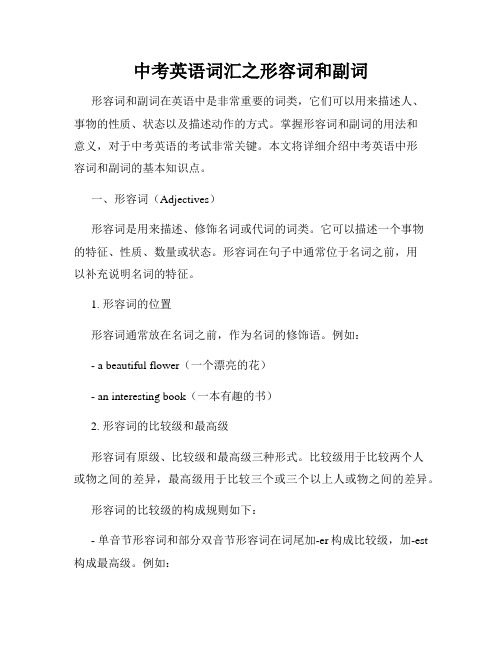
中考英语词汇之形容词和副词形容词和副词在英语中是非常重要的词类,它们可以用来描述人、事物的性质、状态以及描述动作的方式。
掌握形容词和副词的用法和意义,对于中考英语的考试非常关键。
本文将详细介绍中考英语中形容词和副词的基本知识点。
一、形容词(Adjectives)形容词是用来描述、修饰名词或代词的词类。
它可以描述一个事物的特征、性质、数量或状态。
形容词在句子中通常位于名词之前,用以补充说明名词的特征。
1. 形容词的位置形容词通常放在名词之前,作为名词的修饰语。
例如:- a beautiful flower(一个漂亮的花)- an interesting book(一本有趣的书)2. 形容词的比较级和最高级形容词有原级、比较级和最高级三种形式。
比较级用于比较两个人或物之间的差异,最高级用于比较三个或三个以上人或物之间的差异。
形容词的比较级的构成规则如下:- 单音节形容词和部分双音节形容词在词尾加-er构成比较级,加-est 构成最高级。
例如:- small(小的)- smaller(更小的)- smallest(最小的)- tall(高的)- taller(更高的)- tallest(最高的)- 以字母“e”结尾的形容词,在词尾加-r构成比较级,加-st构成最高级。
例如:- brave(勇敢的)- braver(更勇敢的)- bravest(最勇敢的)- 以辅音字母+y结尾的形容词,将y变为i,再加-er构成比较级,加-est构成最高级。
例如:- happy(幸福的)- happier(更幸福的)- happiest(最幸福的)形容词的最高级的构成规则如下:- 单音节和部分双音节形容词在词尾加-est构成最高级。
- 大部分双音节或多音节形容词在前面加most构成最高级。
3. 常见形容词的用法形容词可以用于修饰人物、事物的外貌、特征、品质等。
例如:- beautiful(漂亮的),表示外貌美丽。
例如:a beautiful girl(一个漂亮的女孩)- tall(高的),表示身材高大。
中考英语语法:形容词和副词(2-副词)

形容词和副词(2-副词)●副词的构词:1)大部分形容词+ ly = 副词e.g.deep --> deeply ; loud --> loudly2)以y结尾的形容词,改y为i,+ ly = 副词e.g.happy --> happily ; easy --> easily3)以le结尾的形容词,去e,+ y = 副词e.g. possible --> possibly ; reliable --> reliably4)不规则变化e.g. good --> well ; bad --> worse5)有些副词和形容词同形初中考纲中有七个形容词和副词形式相同: ahead; early; fast; hard; high; late; straight The road ahead was blocked.I’ll run ahead.The early part of her life was spent in Paris.I get up early everyday.He is a fast learner.The water was rising fast.Diamonds are hard.You must try hard.I looked down from the high window.We should aim high and do our best to achieve our goal.She is late for work everyday.I got up late.He was too tired to walk straight.You look better with straight hair.●副词的用法副词在句中用作状语。
e.g.It's raining hard.Don’t drive too fast.This is a fairly useful tool.Luckily, he still got first prize.●副词的位置1)方式状态的副词(Adverbs of Manner)这一类副词是修饰动词专用的,典型拼法是形容词加上-ly。
2024年九年级中考英语+形容词和副词复习课件

early 早的;早 late迟的;晚
例如:The stone is hard.(形容词这个石头是硬的)
He studies hard.(副词)努力地
副词的分类
副词按词汇意义可分为方式副词、程度副词、地点副词、时间副词、 频度副词、否定副词和疑问副词等。 方式副词:well,fast,slowly,carefully,quickly 地点副词:here,there,out,somewhere,home 时间副词:today,yesterday,soon,now,then,recently,still 频度副词:always,often,usually,sometimes,seldom,never 否定副词:no,not,neither,nor 疑问副词:where,how,why,when
slow→slowly
careful→carefully final→finally
2. 如果形容词以-y结尾,变副词时要将y变为i,再加上-ly
例如:angry→angrily
happy→happily heavy→heavily
easy→easily
lucky→luckily
busy→busily
1. Don't worry, sir. I'm sure I can run A to catch up with them.
A.fast enough B.enough fast C. slowly enough D. enough slowly
2. I like this book very much because it is C to read
• The story is very interesting. 这个故事很有趣。 • The man is very interesting. 这个人很有趣。
中考英语常见副词形容词比较级最高级单词归纳总结

中考英语常见副词形容词比较级最高级单词归纳总结一、目录1.中考英语常见副词形容词比较级最高级单词归纳总结2.不规则变化词比较级最高级3.特殊用法比较级最高级4.常用句型总结5.易混淆词汇辨析6.语法考点解析二、中考英语常见副词形容词比较级最高级单词归纳总结1.副词比较级最高级:more,most;less,least;fairly,quite;hardly,scarcely;again,once more;fast,faster,fastest;early,earlier,earliest;high,higher,highest;late,later,latest;near,nearer,nearest等。
2.形容词比较级最高级:big,bigger,biggest;small,smaller,smallest;hot,hotter,hottest;red,redder,reddest;beautiful,more beautiful,most beautiful等。
3.不规则变化词比较级最高级:good,better,best;badly,worse,worst;many,more,most等。
4.特殊用法比较级最高级:as...as中间用形容词或副词原级;the+比较级+ofthe two/in the pair表示两者中比较...的一个;the+序数词+比较级表示第几...等。
三、常用句型总结1.The+比较级...,the+比较级...越...越...2.比较级+than+any other+单数名词/any of+复数名词/any+单数名词表示最高级的含义。
3.比较级+than+the other+单数名词/the other+复数名词表示比较级的含义。
4.比较级+than+同一主语的其他动词表示比较级的含义。
5.The+比较级+主语+谓语表示比较级的特殊用法。
四、易混淆词汇辨析1.more和many的区别:more修饰可数名词复数或不可数名词,表示更多;many修饰可数名词复数。
- 1、下载文档前请自行甄别文档内容的完整性,平台不提供额外的编辑、内容补充、找答案等附加服务。
- 2、"仅部分预览"的文档,不可在线预览部分如存在完整性等问题,可反馈申请退款(可完整预览的文档不适用该条件!)。
- 3、如文档侵犯您的权益,请联系客服反馈,我们会尽快为您处理(人工客服工作时间:9:00-18:30)。
形容词和副词专项讲解1.形容词和副词的功能及位置(1)形容词的功能:主要是用来描写或修饰名词,说明名词的性质、特征、状态,在句中作定语、表语、补足语等成分。
(2)形容词的位置①作定语一般位于它所修饰的名词之前;②alive, afraid, awake, alone, asleep等表语形容词作定语需后置;③修饰someone, somebody, something, anyone, anybody, anything, nobody,nothing等不定代词需后置;④away, long, wide, high, deep, old等词附有数量词语说明时需后置;⑤形容词+介词短语或不定式短语作定语需后置;⑥用and或or连接的两个意义相反的形容词作定语需后置;⑦作表语位于连系动词之后;⑧作宾语补足语位于宾语之后;⑨形容词或形容词词组作状语使用时,可放在句首、句中或句尾。
eg: ①China has a long history.②Who is the greatest man alive? 谁是当今最伟大的人?③I have something important to tell you.④The road is about 50 meters wide.⑤He is a man full of energy.⑥A country, big or small, should be equal. 国家不论大小应该平等。
⑦The weather here is very pleasant. 这里的天气很宜人。
⑧I found the story very interesting.⑨Tired and hungry, he returned home.(3)副词的功能:作状语用来修饰动词、形容词、副词、介词、连词等单词或短语,甚至整个句子,以说明动作性质或状态的特征。
副词也可用来作定语、表语、宾语补足语。
(4)副词的位置①修饰形容词、副词时,放在它所修饰的词的前面;②enough作为副词总是置于被修饰的形容词或副词后;③频度副词、程度副词可放在实意动词的前面,情态动词、be动词、助动词之后;④时间副词和地点副词一般位于句尾。
如两种副词同时出现,则地点副词放在时间副词之前,也可将时间副词放在句首;⑤方式副词修饰及物动词可在及物动词前或宾语后,修饰不及物动词在修饰的动词后或加介词+宾语后;⑥副词作宾语,一般放在被修饰的名词后;⑦副词作表语表示位置,位于系动词后;⑧副词作宾语补足语位于宾语后。
eg: ①Our school is very beautiful.②I don’t know him well enough.We haven’t enough food for you.③He always helps others. He is seldom late for class.④They stayed at home last night.⑤He does his work carefully.⑥They live on the floor below.⑦The light is still on. 电灯还在亮着。
⑧I’m pleased to see you back.2.形容词和副词级别的构成13.形容词和副词级别的用法(1)系动词+ as + adj.原级+ as与……一样;实意动词+ as + adv.原级+ as像……一样;not as或so...as 不如……那样eg: Lily is as careful as Lucy.Lily studies as carefully as Lucy.Lily doesn’t study as/so carefully as Lucy.(2)系动词+ adj.比较级+ than… , 比……实意动词+ adv比较级than…, 比……less...than 不及……;不如……eg: The problem is harder than that one.He speaks English more fluently than I (do).It is less cold today than it was yesterday.(3)the + adj. /adv. 最高级+of 在(……人或物中)最……the + adj. /adv. 最高级+in 在(……范围或场所中)最……eg: Tom is the tallest of us all. Tom jumps the highest in my class. (4)one of the + adj. /adv. 最高级+名词复数……是最……之一among thethe +最高级+ of (三者中)最……的the +序数词+最高级+名词单数第几最……the +比较级+ of (两者中)较……的all the +比较级格外,越发eg: Shanghai is one of the most beautiful cities in China.China is the third largest country in the world.His mother feels all the happier for his success.(5)Which/Who + 系动词+ adj.比较级?(两者中)哪一个较……?Which/Who + 实意动词+ adv.比较级?(两者中)哪一个较……?Which/Who + 系动词+ the + adj.最高级?(三者中)哪一个最……?Which/Who + 实意动词+ (the) + adv.最高级?(三者中)哪一个最……?eg: Which is better, this picture or that one?Who is the cleverest of the three boys?(6)no+ 比较级+ than 和……一样不not+ 比较级+ than 不像……那样eg: This book is no better than that one. 这本书和那本书一样不好。
This book is not better than that one. 这本书不及那本书好。
(7)more and more + 名词越来越多比较级+ and + 比较级(单音节) 越来越……more and more + adj.原级(多音节) 越来越……the +比较级,the +比较级越……就(越)……eg: More and more people are using the Internet.The more you read, the wise you are.(8)more than 多于,大于,超过no more than=only 只有,仅仅not more than =at most 最多,不超过less than 少于,小于,以下no less than= as much/many as 多达not less than=at least 至少eg: He finished the work in less than one hour. 不到一小时他就完成了工作。
They are no less than 1,000 people here. 这里多达一千人。
They are not less than 1,000 people here. 这里至少一千人。
2(9)as + adj.原级+ as基数词+ times 比较级+ than 是……的……倍the +名词+ ofeg: The room is three times as large as that one.(10)as+ adj. + a / an +名词单数+ asthe same +相应名词+ as 与……一样the same aseg: This is as wide a street as that one.= This street is the same width as that one.= The width of this street is the same as that of that one.(11)比较级+ than any other +名词单数(同一范围)比其他任何一……都…… =比较级+ than any +名词单数+ else比较级+ than any other +名词复数(不同范围)比其他任何……都…… =比较级+ than any +名词单数eg: China is larger than any other country in Asia.= China is larger than any country else in Asia.China is larger than any other countries in Africa.= China is larger than any other country in Africa.(12)the + adj.最高级+名词+定语从句+ ever=never…a + adj.比较级+名词最……the most + adj.原级+名词最……a most + adj.原级+名词非常,很eg: This is the best film that I have ever seen. =I have never seen a better film.This is the most moving novel. 这是部最动人的小说。
This is a most moving novel. 这是一部非常动人的小说。
(13)常用almost, exactly, just, quite, nearly, half等来加强原级结构的语气eg: She is just as smart as her sister.(14)常用much, far, even, still, a bit, a little, a lot, by far, a great deal, many times,severaltimes, slightly, all the, rather, any等来加强比较级结构的语气eg: The earth is much bigger than the moon.(15)常用by far, much, a great deal, nearly, almost, ever, on earth, in the world等来加强最高级结构的语气eg: He is the happiest man in the world.(16)最高级的多种表达形式:no +比较级+ than 没有……比……更……否定词+ so +原级+ as比较级+ than any other 比其他任何都……eg: He is the most active boy in class.= No boy is more active than he in class.= No boy is so active as he in class.= He is more active than any other boys in class.4. 常见形容词和副词的用法(1)名词+ ly/ y构成形容词eg:friendly lovely sunny lucky(2)形容词+ ly构成副词,其变化规则为:①一般在词尾+ ly eg:final——finally honest——honestly②以y结尾变y为ily eg:happy——happily easy——easily③以le结尾去e加y eg:possible——possibly gentle——gently④特殊情况eg:whole——wholly true——truly(3)有的副词不带ly多表具体概念,多位于不及物动词后;及物动词+宾语后;介词前eg:They dug deep for treasures.(4)有的副词带ly多表抽象概念,修饰形容词、副词、过去分词;修饰动词位置比较灵活eg:He thought highly of you.(5)有些副词带或不带ly表达意思明显不同,注意固定词组、谚语等习惯表达eg:be wide awake 神志清醒late 迟,晚hard 努力地safe and sound 安然无恙lately 最近地hardly 几乎不(6)多个形容词修饰名词的大体顺序:限定→描绘→大(小)→长(短)→高(低)→形状→年龄→新(旧)→老(少)→颜色→国籍→出处→材料→作用→类别等+名词下面的顺口溜有助于你记忆:限观形龄颜国材eg:a big round black new wooden French table 一张新的大而圆的法国黑色木桌子3。
